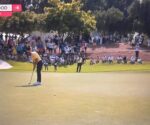Family of Novak Djokovic’s wife were declared bankrupt and penniless | Tennis | Sport
Jelena Djokovic is one of the wealthiest WAGs in the world but her life wasn’t always peaches and cream. The 39-year-old, wife of tennis titan Novak Djokovic, grew up in an affluent area of Serbia. Initially, her family was well-off and life was pretty comfortable but everything changed when her parents, Miomir and Vera, experienced a sudden financial collapse and she and her sister were forced to move away.
“We went bankrupt,” Jelena told Sportal. “We managed, we lived through everything. On my mum’s muscles, with the enormous will, desire and strength that my sister and I have, what she didn’t have, we both went to study abroad.” Despite their hardships, Jelena’s parents remained symbols of inspiration for her and her sibling. “I believe that women acquire many qualities by watching their parents, especially their mothers,” Jelena said. “My mother gave birth to me and my sister early, raised us and worked constantly. Nothing was difficult for her, she fought like hell to ensure a quality life and education for us, in very difficult conditions.”
She also credited her father for having the “strength of a lion” and instilling a work ethic in his children that ensured nothing was taken for granted and everything was worked hard for. “Because of this, my sister and I try to be independent,” Jelena continued.
“We don’t wait for something to fall into our lap, we fight for it. I would advise other young women to fight with all their heart for what they believe in.”
This attitude was evident when it came time for Jelena to go to university. She wanted to study abroad, but since her parents weren’t able to fund such a move, she focused on landing a scholarship.
“It entailed me being the very best student in elementary and high school, in order to win scholarships,” Jelena explained. Her work paid off, and she ended up going to Bocconi University in Milan, where she studied luxury brand management.
Jelena and Novak met in high school in the late 1990s. They began dating in 2005, shortly after the launch of Novak’s professional tennis career but the logistics weren’t easy, especially early on. “Us getting together was like science fiction almost,” Jelena told Hello! magazine last year.
“I was a student barely getting by and he was a very young tennis player who also had no money to spare on expensive trips,” she added. “Airplanes were, at the time, something utterly out of our reach. We contrived and devised these plans: how to meet, how to make our relationship work.”
The pair got engaged in 2013 and tied the knot in Montenegro, on the idylicc island of Sveti Stefan. “The wedding was everything we hoped it would be,” Jelena said. “Our family and closest friends united in a beautiful setting in celebration of our love. It was truly emotional and unforgettable for us.”
Recalling the moment he watched Jelena walk down the aisle, Novak gushed: “Seeing her for the first time in her wedding dress, smiling and walking towards me… She looked like an angel. I was trying to be present in that moment and memorise it. I was focused on her, and her smile, and our baby. It really was a perfect moment.”
Together, they have two children, Stefan and Tara, born in 2014 and 2017 respectively. Jelena, Stefan and Tara have become semi-regular fixtures at Novak’s matches, particularly during Grand Slam tournaments.
She once explained told the that although she gets “passionate” while watching Novak play, she has to be cautious about showing too much emotion. “I have to be careful as I don’t want to get too emotional and distract Novak,” she told the Daily Mail. “We don’t want them to see us get emotional. When I’m at home watching him on the TV, I get even more passionate because I know the cameras aren’t on me.”
Jelena is now the co-founder and global CEO of the couple’s charity organisation, the Novak Djokovic Foundation, putting her degree to good use. As she explained to HuffPost, Novak and his family created the organisation in 2007 to assist disadvantaged children in Serbia by giving them access to early childhood education.








